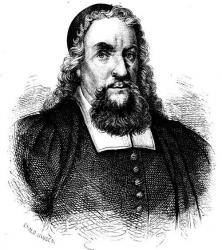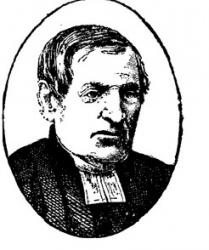Planning worship?
Check out our sister site, ZeteoSearch.org,
for 20+ additional resources related to your search.
- |
User Links
Person Results
‹ Return to hymnal



Export as CSV
Sebald Heyden
1499 - 1561 Person Name: S. Heyd, d. 1561 Hymnal Number: 227 Author of "Gud är vår starkhet och vårt stöd" in Svenska Psalm-Boken af År 1819
Sebald Heyden
Haqvin Spegel

1645 - 1714 Person Name: H. Spegel Hymnal Number: 136 Translator of "Helge Ande, hjertats nöje!" in Svenska Psalm-Boken af År 1819 Haquin Spegel (Haqvin) (14 June 1645 – 17 April 1714), born Håkan Spegel in Ronneby in Blekinge (today in Sweden), was a religious author and hymn writer who held several bishop's seats.
See also in:
Wikipedia
Haqvin Spegel
Wolfgang Musculus
1497 - 1563 Person Name: W. Meusslin Hymnal Number: 310 Author of "I Guds församling Herren Gud" in Svenska Psalm-Boken af År 1819 Meusel, Wolfgang, son of Anton Meusel (Meusslin, Mäusslein, Mosel, Mösel, Musculus, &c), cooper at Dieuze in Lorraine, was born at Dieuze, Sept. 8, 1497. He studied for short periods in the schools at Rappoltsweiler, Colmar, and Schlettstadt, between times wandering over the country and earning his way by his singing. In 1512 he happened to come to the Benedictine monastery at Lixheim near Saarburg, just as Vespers were being sung. His beautiful voice, as he joined in, led the monks to receive him, and here he studied music, and became organist to the cloister. In his 20th year he devoted himself to the study of theology, and soon after began to preach in the church at Lixheim, and in the neighbouring village churches. In 1518 he became acquainted with Luther's writings and embraced his views, but did not leave Lixheim till 1527, after he had declined to be elected as prior. On Dec. 26, 1527, he was formally married at Strassburg to a niece of the former prior at Lixheim. As they were without means she had to take a place as domestic servant, and he, after trying in vain to earn his living as a linen-weaver, was about to attempt to get work as a day-labourer on the fortifications, when he was appointed pastor at the village of Dorlitzheim, near Strassburg. In 1529 he became diaconus of the cathedral church at Strassburg, and then, in the beginning of 1531, was sent to Augsburg, where he for some time officiated in the Holy Cross Church, and, after the Reformation had gained the upper hand, became, in 1537, chief pastor of the Cathedral. When the Interim was forced on the magistracy in June, 1548, Meusel left Augsburg. Thereafter he had to flee from place to place, residing for longer or shorter periods at Basel, Constanz, St. Gall, and Zürich. He finally was invited to Bern as professor of theology, and went there in April, 1549. In gratitude for this timely help he refused various lucrative appointments offered to him from time to time. On Sunday, Aug. 22, 1563, he felt an attack of fever while preaching at Bern, and died on the following Sunday, Aug. 29, 1563. (Koch, ii. 83; Allgemeine Deutsche Biographie, xxiii. 95, &c.) Meusel's best-known work is his Commentary on the Psalms, published in 1550. Eight hymns are ascribed to him, six of which are printed by Wackernagel, iii., Nos. 946-951. A seventh, a translation of the “Christe, qui lux es et dies," is noted at p. 227, ii. The eighth is:—
Der Herre ist mein treuer Hirt, Hält mich in seiner Hute. Ps. xxiii. This appeared in the Augsburg Gesang-Buch 1531, and thence in Wackernagel iii. p. 122, in 5 st. of 71. Wackernagel, seeing that Meusel wrote another version of this Psalm (beginning "Mein Hirt ist Gott, der Herre mein"), and that the version above was not given with his name till in the Nürnberg Gesang-Buch of 1601, gives it as anonymous. It was included in Babst's Gesang-Buch, 1545, in most subsequent collections up to 1700, and in the Berlin Geistliche Lieder ed. 1863, No. 411. In the Strassburg Gesang-Buch, 1560, and many later books, it begins "Der Herr ist mein getreuer Hirt." Translated as:—
(1) "The Lord God is my Pastor gude, "in the Gude and Godlie Ballates, ed. 1568, f. 47 (1868, p. 79). (2) "The Lord my faithful Shepherd is," in the Moravian Hymn Book, 1754, pt. ii., p. 374. In the 1789 and later eds. (1886, No. 430) it begins "The Lord my Shepherd is and Guide." (3) "The Lord He is my Shepherd kind," by Mitt Manington, 1863, p. 20. [Rev. James Mearns, M.A.]
-- John Julian, Dictionary of Hymnology (1907)
Wolfgang Musculus
Salomon Liscovius
1640 - 1689 Person Name: S. Liscov, d. 1659 Hymnal Number: 197 Author of "Väl mig i evighet! nu känner själ och sinne" in Svenska Psalm-Boken af År 1819 Liscovius, Salomo, son of Johann Liscovius, or Lischkow, pastor at Niemitsch, near Guben, was born at Niemitsch, Oct. 25, 1640. He entered the University of Leipzig in 1660, and then went to Wittenberg, where he graduated M.A., and was crowned as a poet. Shortly thereafter he was appointed pastor at Otterwisch with Stockheim, near Lausigk, and ordained to this post April 21, 1664. He was then, on March 29, 1685, appointed second pastor of St. Wenceslaus's church, at Wurzen. He died at Wurzen, Dec. 5, 1689. (Koch, iii. 385; Rotermund's continuation of Jöcher's Gelehrten-Lexikon, iii. 1950, &c.)
Liscovius was one of the best German hymn-writers of the second rank in the 17th century. That is, though his hymns are not lacking in intensity, in depth, or in beauty of form, yet neither by their intrinsic value nor by their adoption into German common use are they worthy to be ranked with the hymns of Gerhardt, Franck, Scheffler and others of this period. They appeared mostly in his Christlicher Frauenzimmers Geistlicher Tugend-Spiegel. The preface to this book is dated April 14, 1672, and it was probably published at Leipzig in 1672; but the earliest ed. extant is that at Leipzig, 1703. Dr. J. L. Pasig pub. 51 of his Geistliche Lieder, with a short biographical notice, at Halle, 1855.
One of his hymns is translated:—
Schatz über alle Schatze. Love to Christ. His finest hymn. 1672 as above, and Pasig, 1855, p. 53. In the Nürnberg Gesang-Buch 1676, No. 509, and the Berlin Geistlicher Lieder Schatz, ed. 1863, No. 826. It is in 7 stanzas of 8 lines, the initial letters of the stanzas forming his Christian name Salomon. The translations are:—
(1) "Treasure above all treasure," as No. 441 in pt. i. of the
Salomon Liscovius
Andreas Petri Amnelius
1638 - 1692 Person Name: A. Amnelius Hymnal Number: 92 Translator of "Skåder, skåder nu här alle" in Svenska Psalm-Boken af År 1819 sv.wikipedia.org/wiki/Andreas_Petri_Amnelius
Andreas Petri Amnelius
Basilius Förtsch
? - 1619 Person Name: C. Förtsch, d. 1619 Hymnal Number: 417 Author of "När jag om morgonen uppstår" in Svenska Psalm-Boken af År 1819
Basilius Förtsch
Arvid August Afzelius

1785 - 1871 Person Name: A. A. Afzelius, d. 1871 Hymnal Number: 28 Author of "Dig skall min själ sitt offer bära" in Svenska Psalm-Boken af År 1819 Arvid August Afzelius (Swedish pronunciation: [ˌaɹːvid ˌɑu̯ɡɵst ˈafseːliɵs]; 8 October 1785 in Fjällåkra – 2 September 1871 in Enköping) was a Swedish pastor, poet, historian and mythologist.
See also in:
Wikipedia
Arvid August Afzelius
Georg Reimann
1570 - 1615 Person Name: G. Reimann, d. 1615 Hymnal Number: 35 Author of "Gud låter sina trogna här" in Svenska Psalm-Boken af År 1819
Georg Reimann
Erik Gustaf Geijer
1783 - 1847 Person Name: E. G. Geijer, d. 1847 Hymnal Number: 89 Author of "Du bar ditt kors, o Jesu! mild" in Svenska Psalm-Boken af År 1819
Erik Gustaf Geijer
Gudmund Jöran Adlerbeth

1751 - 1818 Person Name: G. G. Adlerbeth Hymnal Number: 52b Translator of "Gör porten hög, gör dörren bred" in Svenska Psalm-Boken af År 1819
Gudmund Jöran Adlerbeth


 My Starred Hymns
My Starred Hymns


